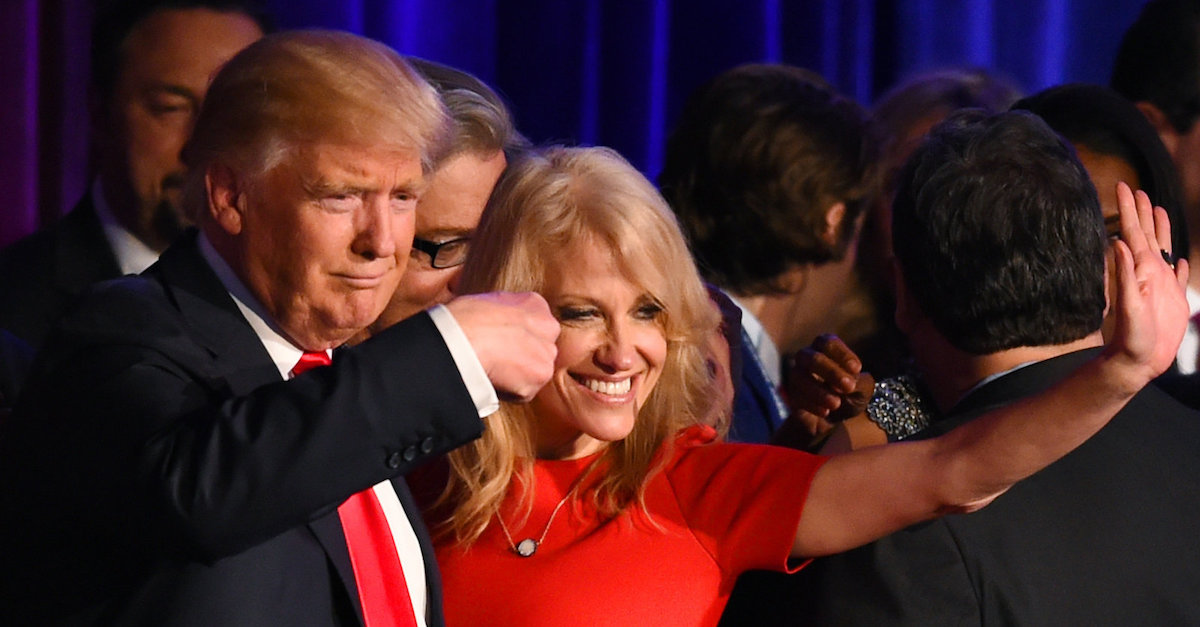
A group of law professors from various institutions who first filed an ethics complaint against White House counselor Kellyanne Conway in Washington, D.C. back in 2017 have updated that complaint to note the Office of Special Counsel’s (OSC) recent determination that Conway repeatedly violated the Hatch Act.
Georgetown Law Prof. Abbe Smith, on behalf of herself and 13 other law professors, filed an addendum at the D.C. Bar’s Office of Disciplinary Counsel on Monday, which highlighted OSC’s recommendation that Conway be punished by removal from federal service. OSC said that if Conway was not punished (President Donald Trump declined to fire her) it would send a message to “all federal employees that they need not abide by the Hatch Act’s restrictions.”
“The June 13, 2019 report follows a previous 2018 OSC report finding that Ms. Conway violated the Hatch Act in two separate television interviews,” the complaint said. “As you know, DC Rule 8.4 (c) prohibits a lawyer from engaging in ‘conduct involving dishonesty, fraud, deceit or misrepresentation.’ These Hatch Act violations are further instances of violations of Rule 8.4 (c) in addition to those we cited in our 2017 complaint.”
Other professors who signed their names on the addendum: Northern Kentucky University Law Prof. John Bickers, Drexel University Law Prof Susan Brooks, Yale Law lecturer Lawrence Fox, Pace University Law Prof. Bennett Gershman (who has penned columns for Law&Crime), Saint Louis University Associate Professor of Law Justin Hansford, Georgetown University Associate Professor of Law Vida Johnson, Northern Kentucky University Associate Professor of Law Jennifer Kinsley, Catholic University Law Prof. Catherine Klein, former visiting Professor at University of the District of Columbia School of Law William Montross, Fordham University Law Prof. Russell Pearce, Suffolk University Law Prof. Ilene Seidman, Northern Kentucky University Associate Professor of Law David Singleton, and Hofstra University Law Prof. Ellen Yaroshefsky.
A second complaint was filed against Conway in New Jersey, but that one was dismissed in February 13, 2018 on the grounds that the “grievance, even if proven, would not constitute unethical conduct.”
Conway, whose name appears on the D.C. Bar’s website as Kellyanne Fitzpatrick, is currently listed as “administratively suspended: non-payment [of dues].” In N.J., where Conway was admitted to the bar in 1992, her good standing status is listed as “retired.” What that means in N.J.:
Retired – The attorney has certified that he or she is “completely retired from the practice of law” and that the attorney’s employment, if any, is not related in any way to the practice of law. The attorney has certified that he or she “does not draft or review legal documents, render legal assistance or advice, teach law, or serve in a court system in any capacity,” in any jurisdiction. An attorney in Retired status is not permitted to practice New Jersey law; provided however, that a retired attorney who certifies to the Supreme Court that the only aspect of the attorney’s participation in legal practice is by providing qualifying pro bono service as defined by Rule 1:21-11 (a) for Legal Services of New Jersey and the associated legal regional programs; for a certified organization under Rule 1:21-11 (b), or for an organization otherwise approved by the Supreme Court, may do so pursuant to those rules. Retired status may not be permanent.
Prof. Yaroshefsky told Law&Crime that, even though Conway’s bar status in D.C. is suspended, the bar could still investigate because Conway could be reinstated by paying dues. The complaint against Conway in D.C. has been pending since it was received on February 24, 2017 and is still under investigation, Yaroshefsky said.
OSC previously said that Conway “violated the Hatch Act on numerous occasions by disparaging Democratic presidential candidates while speaking in her official capacity during television interviews and on social media.”
Conway was dubbed a “repeat offender” who has “shown disregard for the law,” and OSC recommended her removal from federal service, lest her actions “erode the foundation of our democratic system — the rule of law.”
According to the Office of Special Counsel (OSC), the purpose of the Hatch Act in limiting political activities of federal employees working in the executive branch is to ensure “programs are administered in a nonpartisan fashion, to protect federal employees from political coercion in the workplace, and to ensure that federal employees are advanced based on merit and not based on political affiliation.” The president and vice president are exempt from the Hatch Act.
The OSC says violations of the Hatch Act can result in “removal from federal service, reduction in grade, debarment from federal service for a period not to exceed 5 years, suspension, letter of reprimand, or a civil penalty not to exceed $1,000.” Hatch Act violations are not jailable offenses.
Kellyanne Conway amended complaint by Law&Crime on Scribd
[Image via Timothy A. Clary and AFP/Getty Images]